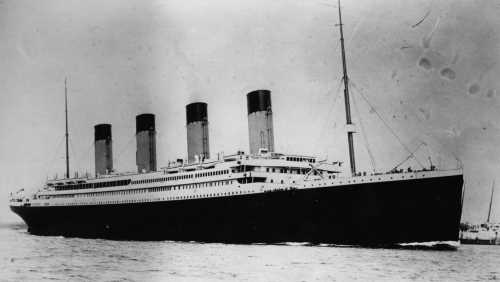Like the disaster that inspired both Titan’s name and journey, last week’s submersible disaster captured the world. Millions waited with bated breath to learn the fate of the sub’s five occupants. On Friday, after a six-day search, the Coast Guard confirmed that debris from the sub consistent with a “catastrophic implosion” had been found just 1,600 feet from the wreck of the Titanic itself.
In the interim, the missing sub dominated the news cycle, prompting thousands of tweets, headlines and hot takes. Before Titan had even been located, one enterprising U.K. network commissioned and aired a documentary about the sub’s deep-sea exploration to the Titanic while Netflix has faced backlash for bringing James Cameron’s 1997 feature about the original disaster back to the streaming service (sources say the timing is a coincidence).
There was no Twitter or Netflix in 1912, the year the Titanic sank, but the scale of the disaster – especially the devastating loss of life – meant that even in a pre-internet world it dominated conversations and headlines… including in Variety.
On April 20, 1912 – just five days after the ship struck an iceberg – Variety reported on Page 4 of that week’s edition that the “terrible marine disaster cast a gloom over everything in the amusement world.” The report, which ran without a byline, also noted the various industry figures – including famed Broadway producer Henry B. Harris – who were on board the ship and even that Benjamin Guggenheim’s sister dropped into a “dead faint” at a music hall when she learned of her brother’s tragic fate.
Check out Variety‘s original report, first published over 111 years ago…
PARALYZING TITANIC TERROR CASTS PALL OVER THEATRES
Amusements Suffering from Effects of Sea Horror, Normal Conditions Not Looked For Inside of Another Week. Many Cancelling Reservations for Sailing
The terrible marine disaster cast a gloom over everything in the amusement world the current week, which was not mitigated but rather enhanced as the additional details became gradually known. Business of all kinds was practically suspended, and the attendance at the theatres of all classes suffered materially. The first half of the week it was impossible to arouse any spontaneous humour at the various musical and comedy shows, which partook very much of the nature of funeral services.
At the Winter Garden Monday night all the boxes were donated by the management for some worthy charity. In one sat the sister of Benjamin Guggenheim, one of the passengers on the ill-fated Titanic. She had been assured in the afternoon that everything was all right, following the false report sent out by the White Star line the Titanic was then being towed into Halifax. About the middle of the show the male members of the box party stepped out for a drink. On their return one, with almost unpardonable stupidity, brought the young woman some sort of information as to the probable fate of her brother. As almost anybody else might have foreseen, she promptly dropped into a dead faint, almost precipitating a panic in the music hall.
Between the first and second acts of “The Wall Street Girl” at the Cohan theatre Monday evening those who stepped out saw the bulletins in front of the Times building. On their return they freely imparted the awful details to the remainder of the audience, with an almost dead silence fastening itself upon the remainder of the performance.
Undoubtedly the most pathetic figure in the theatrical world Tuesday was William Harris, father of Henry B. Harris, who was taken out of town by friends. He was found wandering about the streets in a daze. To all familiar with the comradeship existing between father and son any rumor concerning the father was readily accepted without surprise.
The only known theatrical person on board the Titanic, besides Henry B. Harris was Charles Williams, said to be a former dancing partner of “Hello George” John Scott. He was reported to be among the survivors from the second cabin.
Dr. Fraeuenthal and wife, on their honeymoon, are among the survivors. The doctor, a well-known New Yorker, is very popular with the theatrical profession.
Cancellations commenced to flood the steamship agencies after it became known the Titanic had gone down. It is expected that ocean travel will be very light this season, with only those going across called there upon business.
Several theatrical people who had made reservations for space are undecided whether to go. A number have said they will cancel, going to the mountains or sea shore instead.
With the stories of the survivors and other harrowing accounts of grief that will constantly be in the papers for the next week, it is expected that theatres will continue to suffer in attendance and appreciation until the frightful Titanic Terror commences to dim.
In one of the “small time” vaudeville houses the early part of this week an act there appeared before a drop representing a steamer’s deck. The unintentional reminder of the Titanic became painful, and few paid any attention to the turn while it was on the stage.

Read More About:
Source: Read Full Article
